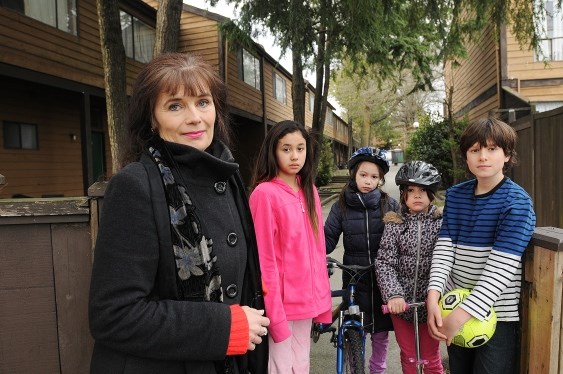The corner of Marine Drive and Cambie Street offers a high-resolution picture of worlds in collision. The skeletal structures of two highrise developments, 30 and 34 stories high, are rising from yawning foundation holes.
Two more highrises, 27 and 21 storeys in height, are on the drafting board to replace a ’70s-era low-rise on the northeast corner. Seventy rental townhomes at the beautifully designed Marine Gardens are at ground zero for the Marpole development blitz.
Jillian Skeet, head of the Marine Gardens Residents Association, moved into the one-hectare development in 2003. By the time her son was three, “it was like an open door policy,” allowing him to ramble freely in the large inner courtyard in the company of other residents’ children, she says.
“Everything is tiny” in her three-bedroom townhouse. “My kitchen is like a postage stamp but I don’t care because I’ve got happy kids and a wonderful community that I love.”
The mother of two sees a massive contradiction between the Lower Mainland’s highrise mania and the “healthy communities” template championed by Vancouver Coastal Health Authority. She insists a city skyline increasingly dominated by skyscrapers is not a welcoming environment for families with active children.
On Dec. 20 2013, Brian Jackson, the City of Vancouver’s general manager of planning and development services informed the Marine Gardens Residents Association that “Council has not made any decisions regarding the rezoning for Marine Gardens,” but “saving the townhouses as requested in your letter would not be considered an option....”
Skeet was blindsided by what read like an undemocratic “done-deal” for the wrecking ball.
The city has directed Concord Pacific to replace the Marine Gardens units one for one, incorporating them with pre-school and toddler daycare into the planned two towers development.
“There’s going to be 70 units, and if you go on to the city website it’s listed as affordable housing. It’s not, it’s market,” the community activist says.
A document from GBL Architects does indeed refer to the “Marine Gardens replacement market rental units.”
A three-bedroom, 905-square-foot apartment in the new development, comparable to Skeet’s current residence, will command a $2,100 a month rent, she says.
That would require a $72,000 annual income, if you went by the 30 per cent traditional portion of income earmarked for housing.
Ironically, Skeet says the residents have received “so much pressure” from the developer Concord Pacific “because they want us to be happy. They’re offering free rent and moving out bonuses... and being very flexible with our moving out dates.”
“I keep saying you’re being very generous, but you have to understand is that what we’re losing is community and a lifestyle that cannot be replaced.”
The community activist concedes that Marine Gardens is aging and requires renovation, but insists it is a “wonderful concept and a unique part of Vancouver.”
Ironically, the complex served as a demonstration project of innovative, sustainable and affordable living for the UN Habitat for Humanity conference in Vancouver in 1976. It changed hands over time, eventually selling to Concord Pacific.
But Marine Garden’s architectural DNA is traceable back to the then-revolutionary but now-normative ideas of urbanists like Jane Jacobs.
There’s another interesting angle to this story. Skeet says she was told the land was donated to the City of Vancouver as a park. Clay Realty was not allowed to cut down the trees and the ground-level development was built around the foliage.
Through the Vancouver archives, Skeet discovered the area was once Delta View park. With that part of the story confirmed, she visited the British Columbia Land Title Offices after gathering money from neighbours to conduct a historical title search.
“As far as we know there was a covenant — the trees could not be cut. The day I was supposed to go and pick up the historical title, I got a phone call saying don’t come, we can’t find the title you’re looking for — it’s not where it should be.”
In Skeet’s telling of it, the city’s no-option for Marine Gardens residents is accompanied by a giant question mark of heritage.
“We’re going to continue to try to save our community because we believe it’s not just the right thing for us, but for society overall,” the community activist says with a smile.



